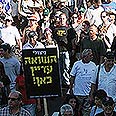
Holocaust survivors. Still here, crying out for help (archives)
צילום: גיל יוחנן
81%: Shoah survivors treated badly
Majority of public believes Holocaust commemorated appropriately in Israel although State failing to maintain survivors' dignity, Ynet-Yesodot survey shows
The majority of the Israeli public is satisfied with the way the State of Israel commemorates the memory of the murdered Jews of Europe, according to a survey ordered recently by Ynet and the Yesodot Center for Torah and Democracy ahead of Holocaust and Heroism Remembrance Day.
The public also believes that the Holocaust survivors' dignity is being maintained "in a moderate manner" and that school trips to concentration camps in Poland are important. Among the religious respondents, many are in favor of "upgrading" Holocaust Day with prayers and a fast.
The Ynet-Yesodot survey was conducted by the Panels research institute among 504 respondents – a representative sample of the adult Jewish population in Israel. The maximal sampling error was 4.4%.
Some 60% of the respondents said the Holocaust was commemorated by Israel in an appropriate manner, 30% defined the commemoration as "mediocre" and 8% said it wasn't good enough (the rest had no opinion).
In all sectors – seculars, traditional and religious/ultra-Orthodox – most people are satisfied with the way the State commemorates the Holocaust.
Forty-two percent of the respondents said the State was maintaining Shoah survivors' dignity in a "moderate manner", 39% said survivors' dignity was maintained in an "almost non-existent" manner, and only 17% were satisfied with Israel's treatment of Holocaust survivors (the rest had no opinion).
Among traditional and religious/haredi respondents, the most common response (51% and 43%, respectively) was that survivors' dignity was maintained in a "moderate manner", while among the seculars, the most common response (46%) was that survivors' dignity was maintained in "an almost non-existent" manner.
The next question presented to the respondents was, "Do you think school trips to Poland in their current framework are important?"
Seventy-three percent replied that they trips were "very important", 18% said they were "quite important", and only 7% said they were "slightly important or not at all". In the religious/haredi sector, a significant majority said the trips were very important.
Finally, respondents were presented with four ways of preserving the memory of the Holocaust among the Jewish people and were asked to select one or more options.
Seventy-seven percent said the State must invest more in education, 66% prefer "nurturing and strengthening the second generation of Holocaust survivors to convey the magnitude of the disaster", 45% believe that creative ways to preserve the memory should be found on the Internet, and 11.5% are in favor of declaring Holocaust Remembrance Day as a day of fast and prayer.
The last option is supported, according to the survey, by only 24% of Israel's Jewish residents, although a majority was found among religious and haredi residents (52%).
Uniting nature of Holocaust Day
"According to the survey, the majority of Israel's citizens believe Holocaust survivors are not receiving the respect they deserve," says Yesodot Educational Director Shoshi Becker. "In light of the way their human dignity was damaged during the Holocaust, these are concerning results.
"Holocaust survivors are very old people, and therefore the State must take care of their medical and nursing needs in any way possible. Caring for the survivors will be in itself an important way to commemorate the Holocaust.
"We see that most respondents are not interested in Holocaust Day becoming a religious day. The reason might be the desire to maintain the day's uniting and national nature.
"Beyond the memory of the Holocaust, Holocaust Day can be a uniting day which emphasizes the special Jewish fate, but also the importance of human dignity and the values of democracy.
"The survey also calls on the educational system to do more to preserve the memory of the Holocaust. Large parts of the public view education as the main element capable of preserving the memory of the Holocaust among the Jewish people for generations."
- Follow Ynetnews on Facebook










